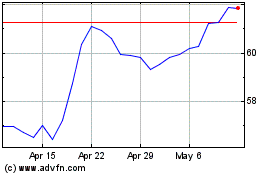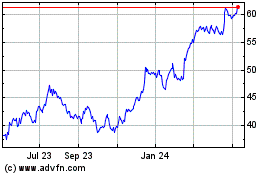Yellen Pressed to Scrutinize Big Banks in Wake of Wells Fargo Scandal -- Update
September 28 2016 - 3:42PM
Dow Jones News
By Ryan Tracy
WASHINGTON -- Federal Reserve Chairwoman Janet Yellen promised
lawmakers the central bank will scrutinize all big banks in the
wake of Wells Fargo & Co.'s phony account scandal, the latest
sign that fallout from the firm's missteps could affect the entire
industry.
During a contentious hearing on bank regulation before the House
Financial Services Committee, Ms. Yellen faced questions from both
parties about whether the Fed has adequately addressed the risks
posed by the largest U.S. banks. Several Democrats said the Wells
Fargo scandal was an indication that big banks are too big to
manage and should be broken up. Rep. Sean Duffy (R., Wis.), without
citing Wells Fargo, questioned whether the Fed has failed to end
the problem of taxpayer bailouts for big banks.
The comments were a reminder of just how unpopular big banks are
in Congress, and how much pressure Ms. Yellen and other regulators
face to crack down on them.
"I would be amazed if this practice was just limited to Wells
Fargo," said Rep. Stephen Lynch (D., Mass.). He told Ms. Yellen to
hold bank executives accountable: "Make their life hell."
"Wells Fargo has identified two additional reasons to break
these institutions up," said Rep. Brad Sherman (D., Calif.), by
creating an incentive system that pushed employees to open fake
accounts and failing to change the system when problems cropped
up.
The hearing also touched on monetary policy, and Ms. Yellen
underscored the Fed has "no fixed timetable" for raising interest
rates as the economy continues its recovery. Fed officials earlier
this month held interest rates steady but indicated they intended
to raise rates about 0.25 percentage point before the end of the
year. "We expect to see solid job growth continue, but we do need,
if things continue on their current course, to gradually remove the
accommodation that is there," she said.
On Thursday, the same committee will hold a hearing on the Wells
Fargo matter with testimony from Chief Executive John Stumpf.
Wells Fargo didn't admit wrongdoing as part of a recent
settlement with regulators. It announced clawbacks of executive pay
on Tuesday and said it is ending the sales practices under
scrutiny.
Ms. Yellen said the Fed wasn't directly responsible for
regulating that aspect of Wells Fargo's business, because it
oversees the firm's holding company. She said the Fed has launched
a broad review of big bank compliance regimes.
"We are undertaking a look comprehensively not only in the
consumer area but compliance generally because there have been a
very disturbing pattern of violations" in businesses such as
mortgage lending and foreign-exchange, she said.
Fed governor Daniel Tarullo has previously mentioned the Fed
compliance review, but Ms. Yellen's commitment to it at the hearing
is significant because it means she likely will have to show
lawmakers results.
Mr. Duffy, chairman of the committee's investigative panel and a
regular Fed critic, aggressively questioned Ms. Yellen about
whether the Fed has ended the problem that big banks are "too big
to fail" without a bailout. He didn't mention Wells Fargo but said
"too big to fail still exists."
"I wholeheartedly disagree on many issues with Elizabeth Warren,
but at least she is truthful on that one," he said, referring to
the Democrat senator from Massachusetts who has called for big bank
breakups.
Though lawmakers appear uneasy with the state of big bank
oversight, they aren't unified on how to handle the issue. Mr.
Duffy and other Republicans want to significantly alter or repeal
the 2010 Dodd-Frank law that directed the Fed and other regulators
to impose stricter rules on big banks. Ms. Warren and other
Democrats favor reinstating the Depression-era Glass-Steagall law
that separated investment banking from traditional lending.
Ms. Yellen didn't appear to favor either agenda, and defended
what regulators have done to date. She said that under Dodd-Frank,
the Fed has made "significant progress" in reducing the probability
of future bailouts. Major regulatory changes include capital
requirements that limit borrowing, "living wills" outlining how
they could fail in an orderly way and annual "stress tests."
She also said she didn't believe reinstating Glass-Steagall
would have prevented the 2008 financial crisis, and declined to say
the Fed would use its regulatory power to break apart big
banks.
Looking ahead, Ms. Yellen reiterated the Fed's commitment to
raise capital requirements for big banks as part of the stress
tests. She said the Fed stands ready to tighten capital rules
further if the big banks don't prove, in their living wills, that
they could go through bankruptcy without taxpayer help.
In her prepared testimony, Ms. Yellen said regulators need to do
more to alleviate the regulatory burden on small lenders, a signal
the central bank may soon propose easing rules for community banks.
She said the Fed and other agencies "are actively considering
proposals to simplify regulatory capital requirements for community
banks."
David Harrison contributed to this article.
Write to Ryan Tracy at ryan.tracy@wsj.com
(END) Dow Jones Newswires
September 28, 2016 15:27 ET (19:27 GMT)
Copyright (c) 2016 Dow Jones & Company, Inc.
Wells Fargo (NYSE:WFC)
Historical Stock Chart
From Aug 2024 to Sep 2024

Wells Fargo (NYSE:WFC)
Historical Stock Chart
From Sep 2023 to Sep 2024
